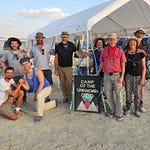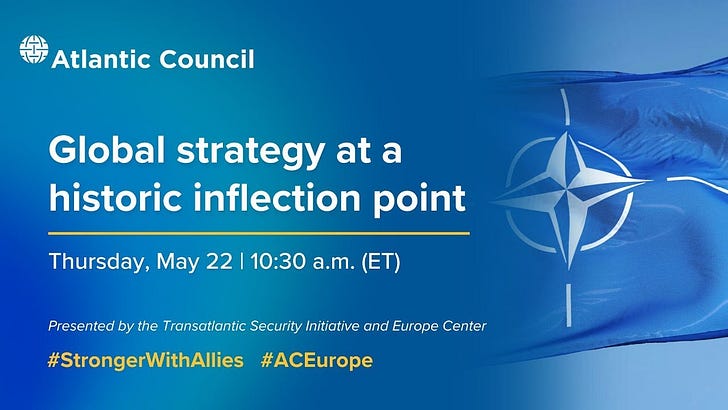I am writing this on June 6th, 2025.
The last morning of the Dayton Dialogue I went out walking in the beautiful neighborhood where our hosts lived. I wanted to get my blood flowing and a breath of fresh air before we drove down to the venue to attend the seminar later that morning. The grass was incredibly green as I walked by, with a deer standing in someone’s yard looking at me. It was around 50 degrees so no mosquitoes. There was a feeling of peace and stillness in the air.
This sense of peace must be the reason they chose Dayton be the location of the peace accords to stop the Balkans war 30 years ago. Here I was now, attending a NATO forum, hearing from European and American officials, talking about that war, the current state of affairs, and the future of NATO, while there is an active hot war raging in Ukraine. The things they were discussing took me back to my time in the Navy, in 1994.
We were floating in the Adriatic Sea. I was a young officer assigned to a destroyer, the USS Barry (DDG-52), as the ordnance officer. When I wasn’t carrying out my duties as the ordnance officer, I stood watch on the bridge. We had been assigned to a geographic box drawn on charts in the ocean, tasked with enforcing a NATO directed arms embargo. Smugglers would try and traffic weapons across to the Croatian or Bosnian coastline. We were 1 ship among many from multiple NATO countries, spaced geographically in order to be able to effectively intercept any weapons smugglers.
We would sit there drifting in the ocean, and when we drifted towards the edge of the box, we would steam back over to the center of the box, and then wait again. There wasn’t much of a current. Our ship could get going very quickly if necessary, and we did from time to time. Multiple ships came into our area, and we sent boarding parties over to them to inspect their cargo. In conversation with folks from other warships who did the same thing, we heard about incidences in which large caches of weapons had been confiscated from smugglers.
From time to time small speedboats would come into our area. We called them “cigarette boats” because we had heard that they were smuggling cigarettes. We weren’t too concerned about that – it was the weapons smuggling that was causing the problems in the ongoing Balkans war.
Most of the time floating in a designated area of the ocean was boring. But every once in a while we would have quite a bit of excitement. We had a blockade runner come one night, a large cargo ship. It acted in a hostile manner towards us – I can’t remember if it made like it was going to ram us, or if it was something else. In any case, we shadowed it very closely until the high NATO command sent in a team of Dutch special forces to board and commandeer the ship, if I remember right. They landed by rope descent from a hovering helicopter. The event became the subject of our wardroom conversations for several days.
1944, 1994, 1995, 2025…
Today as I write this, it is June 6th, 2025, the 81st anniversary of the D-day landings. Looking back at 6 months in 1994, from May through December, it was that period of time in which my ship deployed to support our government’s international obligations with NATO and the UN in the Mediterranean and the Persian Gulf. It was the same overseas deployment where, in June, we had participated in the re-enactments of the 50th anniversary of the D-day landings in Normandy, June 6th, 1944. I have 4 years in view here, which help put in mind the dates we are looking at. First, there was 1944, when the actual D-day landings took place. Then, in 1994, on the 50th anniversary. Later that year, my ship participated in the weapons embargo on the Balkans. One year later, in 1995, the Dayton Peace Accords were signed (In November, not in June). Then today, in 2025, 81 years after D-day, 31 years after my deployment in 1994, 30 years after the signing of the Dayton Peace Accords to end the Balkans war.
The anniversary of D-day ties them together because we remember it as a time when the world stood together against Nazi tyranny. The Dayton Peace Accords that were signed in 1995 came in the aftermath of the end of Soviet tyranny, when an inter-ethnic conflict arose that threatened to cover that region with darkness once again just as it was about to emerge into the light. At the panel discussion led by the President of Kosovo, one of the things she emphasized was that since 1995, this is the first generation of children in over 1000 years where they have grown up not having known war. That is an incredible achievement, and the United States can rightfully take credit for helping to make that happen.
Unfortunately, a new tyranny has now emerged that threatens to engulf the region once again. There are many reasons for it happening now, not the least of which is that we are in a global 4th turning crisis.1 This tyranny could possibly be described as a new Soviet tyranny, even though the Russian nationalist movement is not based on ideological communism, but instead on the desire of Russian leaders to make Russia a great power once again.
Back in 1994, when the Balkans war was in full swing, the Soviet Union had already fallen, as well as the Berlin Wall. Francis Fukuyama had already written his famous “The End of History” essay, in which he postulated that liberal democracy would always triumph over totalitarian systems. European leaders, while still maintaining their military requirements with NATO for the moment, became convinced that there would never be another major war. They were already thinking about the peace dividend, and how they could reduce military spending and convert those expenditures to entitlement programs.
Yet even while the leaders were thinking “peace and safety,” the Balkans war had already started in their own backyard. So their dreams of never having to raise military expenditures again, because liberal democracy would always triumph, were just dreams. Their stubbornness at not being willing to see that a war in the Balkans was more their responsibility to solve than America’s became a point of contention, according to what panel members were saying at the Dayton Dialogue last week. Multiple speakers relayed the historical events, how the USA at the time had tried to convince the European members of NATO to take the lead in putting a stop to the Balkans war, but they would not act. That, they said, was the reason why President Clinton had finally decided to push the US military to step in and take the lead, which ultimately led to the Dayton Peace Accords of 1995.
Looking back on those incidents now, and hearing the things they spoke of at the conference, I realize how little I understood at the time. While I was certainly concerned about our role in the bigger picture, which was interdicting the flow of weapons, as a junior officer on a Navy ship busy with my assigned duties, I really didn’t know how bad the problems were on the ground in the Balkans war. Listening to the speakers at the Dayton Dialogue, it became more clear what was happening. The atrocities committed, the mass suffering of civilians, the displacement of people, the genocide at Srebrenica.
Walking around our peaceful neighborhood the morning of the last day of the seminar, I could see what the people that suffered through war would like to have. They would like to have peace. There is peace here in America – perhaps not everywhere, and perhaps under threat in some areas, but in general there are still some amazing pockets of peace. We hope and pray the peace will continue, and that it will endure past the tensions we are all experiencing. The world, however, is in the biggest geopolitical crisis that it has had since World War 2. That was a 4th turning event, the pinnacle of the last 4th turning crisis.2 The D-day invasion on Normandy Beach 81 years ago today was a huge and necessary step to ending that last great calamity. For our current crisis, however, the end is still a long ways off. The current crisis has already produced several hot wars, a new cold war between the USA and China, and political tensions that often seem insurmountable. None of these wars seem anywhere close to being resolved. The pinnacle event, which happens in every 4th turning crisis, has yet to materialize.
As for peace, multiple speakers from the Balkans countries talked about how much they desire it. They said that there were still significant tensions – the ethnic tensions that have historically divided Serbs, Croats, and Bosniaks are still very present in the region. There is a need for constitutional reform in multiple governments, the removal and prosecution of corruption, and economic improvement. Some political figures, often supported by Russia, have risen to prominence and advocated secession. One in particular, the President of the Republika Srpska (RS), has advocated seceding from Bosnia and Herzegovina (BiH)—the sovereign country established by the 1995 Dayton Accords at the end of the Bosnian War. A secession event would raise the probability of a 2nd front to the war in Europe rather than reduce it. However, if some of the major concerns listed above can be addressed, it is believed that perhaps at least the Balkans may pass through this period without breaking out into another major war.
Ultimately, the big takeaways of the conference were as follows.
Ethnic tensions are still very much a problem in the area.
Russian propaganda is continuing to stir up the population and to cause unrest.
The EU sees its future security as being significantly connected to the current Balkans conflict resolving itself peacefully and favorably towards the EU.
The EU is working very hard to re-arm, re-industrialize, and re-build the defense industrial base, but it will take time.
The EU does not believe at the moment that it can survive without the support of the USA.
The USA wants Europe to re-arm and take up more of a role in its own defense, but does not intend to abandon the EU or to leave NATO.
The Trump administration’s tariffs and other pressures have forced the EU and NATO countries to start to get their act together and build up their militaries once again.
With all of those conclusions, I came away expecting that there would be a rising level of attention in news cycles over the next few weeks and months about the Balkans, the EU countries ramping up defense spending, tensions between Baltic countries and Russia, and of course an increase in activity in the Ukraine war.
What has happened since then, in the past week and a half? Here are some recent news items:
May 25 – The Telegraph reported on Baltic States keeping a wary eye on Russia’s shadow fleet in the Baltic Sea. This was in response to an incident earlier in May in which an unflagged tanker was escorted out of Estonian waters, and during the incident, the Estonian Navy ship was buzzed by a Russian fighter jet.
May 27 - Germany, France, Britain and the United States removed limits on ranges for weapons supplied to Ukraine, so that they can fire on targets deep within Russia.
May 27 – Poland announced that its military is planning to conduct the largest military exercise in several years this coming September.
May 27 – Residents of Poland and Lithuania began leaving the Suwalki corridor on fears that an attack by Russia against the Baltic states would go through their land first.
Two rounds of talks were held between Russia and Ukraine in Istanbul, in which both sides outlined their conditions for peace. Analysts said that both sides remain very far apart on terms.
May 29 – Russia accused Serbia of selling arms and ammunition to Ukraine, saying it’s a stab in the back by its longtime Slavic Balkan ally. Analysts indicated it was not clear why Russia chose to raise this issue with Serbia now, when it has been well known that this activity has been happening through uncontrolled 3rd parties for quite a long time. This is the specter of Russian disinformation stoking Serbian nationalist sentiments in order to establish their own outpost in the middle of Europe.
May 31st – French President Emmanuel Macron gave the opening speech at the Shangri-La Dialogue in Singapore. China broke from the past and did not send their defense minister, but instead sent a lower level military official. A snub, perhaps? Uncertain. In his speech, President Macron continuously talked about the importance of maintaining the international order, indicating where the minds of European officials are in regards to all of the current conflicts around the globe.
June 1st – After the Russia-Ukraine peace talks failed, Ukraine staged a covert drone strike on Russia’s strategic bomber force, damaging close to 1/3 of all of their strategic bombers.
June 2nd – Poland elected a new president, who some media circles are describing as being unqualified due to past scandals. His history indicates a strong anti-Russian stance, but also a strong anti-immigrant stance and a fairly strong anti-LGBTQ stance. These are real points of contention for members of the European elite. See my discussion below on why free immigration is looked at as being extremely important by European leadership.
June 5th – North Korean leader Kim Jong Un promised his country’s unconditional support for Russia's invasion of Ukraine after meeting with Russian Security Council Secretary Sergey Shoigu.
June 6th – Russia hit six regions of Ukraine with airstrikes (mostly ballistic missiles and drones) in an apparent response to Kyiv’s attack on Russian airfields on June 1st. Russian strikes involved over 400 drones and 40 missiles, marking a significant escalation of the conflict.
So those are just some of the news items. I will be paying more attention to hearing about anything that comes out of the Balkans, but the overall big picture that stands out about the whole region is related to how the Ukraine war is still escalating, and not de-escalating. Just 3 weeks ago the world thought that President Trump might be able to cut a deal to end the war. Yet no deal happened, and Vladimir Putin doubled down on his intent to prosecute the war while making impossible demands on Ukraine.
As to why European officials are so keen on continuing mostly free immigration, something came out at one of the panel sessions at the Dayton Dialogue. It was in fact a question that I asked the panel, as to what was the likelihood of a new war breaking out again, as it had back in the 90s. The panel member responded to my question by stating that the reason he did not believe that the Balkans were likely to experience another civil war pitting all the different ethnic groups against each other was because of the freedom of immigration to other parts of the Balkans and other European countries. The idea is that freedom of immigration provides a release valve when tensions start to break out in one place or another, because people can just leave and get away from the conflict. Of course, what they didn’t talk about was how having massive free-flowing immigration raises its own set of problems, as both Sweden and Germany have experienced in recent years. Regardless of either side of the immigration debate, if there is a war stoked by Russian disinformation, and connected to Russia’s ongoing operations in Ukraine, that is an entirely different kettle of fish. This, in reality, is the main problem that Europe is facing. Even though there may be only a low a danger of a new ethnic civil war breaking out in the Balkans, there is still a very real danger of Russia opening a new front in the Ukraine war, this time not against Ukraine, but against what it perceives to be its mortal enemy – NATO. The convoluted mess that Russia is trying to exploit is that if it can stoke inter-ethnic tensions high enough, it may give itself a justifiable reason to try and intervene. Or the more likely alternative would be that they would support Serbian nationalists in attempting to break away from the constitutional requirements of the Dayton Accords, and convince Serbia to become one of their main proxies in the slow dismantling of NATO. By flipping Serbia to their side, they gain a foothold and try to slowly chip away at the unity of NATO and the European Union.
The common media narrative is that the Trump administration is sort of helping Putin in this effort. Interestingly enough, this was not what we heard at the Dayton Dialogue. Instead, both European and American officials in the Trump administration stated repeatedly that America and Europe were going to continue to work together, and that NATO is not in any way in danger of falling apart from within. Quite to the contrary, what is actually happening now is that European countries have finally started to get their act together to re-arm and stand against potential aggression from Russia, and the United States fully intends to help them in this endeavor. That is, as long as they are willing to pay their share, and take the lead in their own defense. That is America’s only real stipulation. America will not foot the bill for European defense and will not put our own soldiers in harm’s way for Europe in order for Europe to continue funding its entitlement programs. But if Europe carries out its responsibility for its own defense, America stands ready to help. These are some of the things we heard at the Dayton Dialogue.
I will wrap this up by bringing up something I believe is particularly important. The reason I am going to these events like the Dayton Dialogue, NATO seminars, State Department symposiums, is more than just in order to have a proper understanding of the risks facing our missionaries overseas. That is a huge component, and it is what got me started, but this is bigger than that. This is about understanding the worldviews of the leaders and trend setters around the globe, in order to get an idea of where the world is going to go over the next century. While many Christian ministries focus their view on how current events fit into end times biblical prophecies, I am not thinking about that so much. The reason is that I believe that God is calling us (myself, Ginny, and 2 other ministry partners) to pursue this is not only to communicate to my own mission organization on how these things affect risk management. It is also to equip churches, mission organizations, and Christian institutions to be able to speak intelligently on these matters, to motivate followers of Christ to get involved, and to move away from the fear based narratives that tend to plague the church.
A recent trend in many fields of discipline, including the study of geopolitics and international relations, is that they have been looked at as purely secular fields. The expected mode of behavior is that if you are a Christian, you might consider checking your faith in at the door in order to participate, because it is a secular endeavor. I have noticed this in talking to people about other fields of work also, whether they be doctors, investors, lawyers, warehouse workers, or whatever. I felt the tension myself when I worked as an engineer (and I didn’t always respond well to the tension). I noticed the idea emerging in a conversation we had with a member from a think tank at the seminar, who was of Bosnian Muslim ancestry, but who told us that he is an atheist. There is an idea that someone’s religious beliefs should not be allowed to influence the opinions or conclusions that they draw in studying international affairs, because it is a fundamentally secular field. This is, of course, unrealistic, as it is impossible to separate the core of how one thinks of himself or herself, which can be fundamentally religious, from the activities he does.
We are watching the world changing around us as we speak. As followers of Christ, if we are truly going to be “the salt of the earth” and “the light of the world” (Matthew 5:13-16), we must be counted among those who will help shape the direction that the world is going. In order to do this, we must get involved, and then excel in the areas we are involved in. We must be able to engage with the people around us using sound reasoning and biblical principles. We must also learn to put aside our fears. Too much of the evangelical world is filled with fear-based narratives, often associated with interpretations of end-times prophecies. While we might very well be living in the end-times, we cannot know for certain until He actually does return. If we are in fact living in the end-times, when Jesus returns, I want to be found as the faithful and wise steward (Luke 12:43), not as the lazy one. That is where our focus should lie, rather than living in fear that the secular world is out to get us. I hope this is the way you think as well.
I’m back home now in Texas. The grass around the houses in our neighborhood here is very green. It is beautiful here, too. Of course it is naturally hotter here than in Dayton, Ohio. There are lots of mosquitoes. But it is still peaceful in this part of Texas, especially when out walking in the morning, before it gets too hot. We pray that the peace will prevail.
For more information on the 4th Turning theory, historian and demographer Neil Howe wrote 2 books on this. The first one is called “The Fourth Turning: An American Prophecy,” was published in 1997. The 2nd one, called “The Fourth Turning is Here,” was published in 2023. For a summary of how these things are manifesting in the world today, you can review the first 20 minutes of a presentation I gave to our security team in March, by following this link. You can also follow his substack here.
Same as above.











